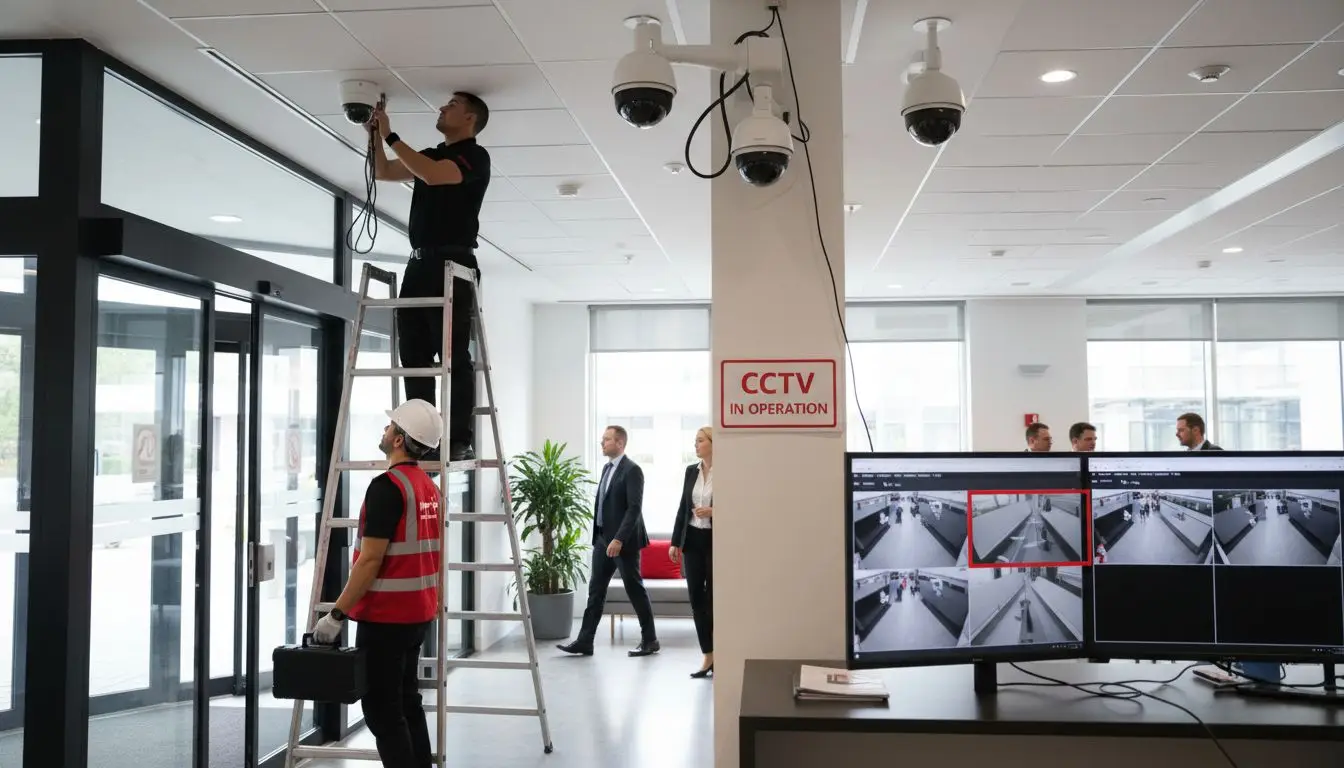Did you know that CCTV cameras now capture over 6 billion hours of video worldwide each day? Security has become a top priority for homeowners and businesses alike as break-ins and vandalism remain real threats. Understanding how CCTV works and what types are available can make a real difference in protecting your property, keeping your space safe, and helping you choose the right security solution for your needs.
Table of Contents
- What Is CCTV? Core Concepts Explained
- Types of CCTV Systems for UK Properties
- How CCTV Deters Crime and Improves Safety
- UK Legal Requirements for CCTV Installation
- Risks, Costs, and Common Mistakes to Avoid
Key Takeaways
| Point | Details |
|---|---|
| CCTV Definition | Closed-circuit television (CCTV) is a private surveillance system designed to monitor and record specific areas using video cameras. |
| Types of Systems | Various CCTV systems, including analog, digital IP, wireless, and PTZ cameras, cater to different monitoring needs and properties. |
| Crime Deterrence | CCTV effectively deters crime in public spaces, workplaces, and educational institutions by providing surveillance and evidence for law enforcement. |
| Legal Compliance | UK CCTV installations must adhere to data protection laws and transparency guidelines to ensure responsible surveillance while protecting privacy rights. |
What Is CCTV? Core Concepts Explained
Closed-circuit television (CCTV) is a sophisticated security technology designed to monitor and record specific areas through strategically placed video cameras. According to Britannica, CCTV systems uniquely transmit video signals to designated monitors, distinguishing them from traditional broadcast television by maintaining a private, controlled surveillance network.
At its core, a CCTV system consists of several critical components that work together to provide comprehensive security coverage. These include:
- Cameras: High-resolution devices capturing visual data
- Recording Equipment: Digital or analog systems storing captured footage
- Transmission Infrastructure: Cables or wireless networks moving video signals
- Monitoring Stations: Screens where live and recorded footage can be viewed
Unlike broadcast television, where signals are transmitted publicly, Wikipedia emphasizes that CCTV signals remain restricted to a specific set of monitors. This privacy ensures that surveillance remains confidential and controlled, making it an ideal solution for securing sensitive environments like businesses, public spaces, and private properties.
Key Applications of CCTV Systems
Modern CCTV technology extends far beyond basic monitoring. Smart CCTV systems now integrate advanced features like motion detection, facial recognition, and real-time alerts, transforming traditional surveillance into intelligent security ecosystems. Whether protecting retail spaces, monitoring industrial facilities, or enhancing home security, CCTV systems have become an essential tool in contemporary safety strategies.
Types of CCTV Systems for UK Properties
Understanding the diverse landscape of CCTV systems is crucial for selecting the right security solution for UK properties. According to Wikipedia, CCTV technologies range from analog to digital systems, offering property owners an extensive array of monitoring capabilities tailored to specific security requirements.
Key types of CCTV systems commonly used in UK properties include:
- Analog Systems: Traditional cameras transmitting video through coaxial cables
- Digital IP Cameras: Network-connected cameras providing high-resolution digital footage
- Wireless CCTV Systems: Cameras transmitting signals without physical cable connections
- Pan-Tilt-Zoom (PTZ) Cameras: Cameras with remote directional and zoom capabilities
Britannica highlights that modern CCTV systems can be classified into fixed cameras, remote-controlled units, and 360-degree view systems. These variations offer property owners flexibility in designing comprehensive surveillance strategies.
Tailored Solutions for Different Properties
Whether protecting a small residential property or a large commercial facility, wireless CCTV systems provide versatile security solutions. Each system type offers unique advantages, from seamless installation to advanced monitoring capabilities, ensuring property owners can find a perfect match for their specific security needs.

Here’s a comparison of the main types of CCTV systems used in UK properties:

| System Type | Key Features | Typical Applications |
|---|---|---|
| Analogue Systems | Coaxial cable video Lower resolution | Older properties Basic security |
| Digital IP Cameras | Network connected High resolution | Modern offices Retail spaces |
| Wireless CCTV Systems | No cables Flexible installation | Homes Small businesses |
| Pan-Tilt-Zoom (PTZ) | Remote direction Zoom capability | Car parks Large facilities |
How CCTV Deters Crime and Improves Safety
Closed-circuit television (CCTV) has emerged as a powerful tool in crime prevention and community safety. According to NI Direct, these systems are strategically designed to prevent and detect criminal activities, provide crucial evidence to law enforcement, and ultimately enhance public safety and economic well-being.
CCTV’s crime deterrence capabilities extend across multiple environments. Key areas where these systems significantly impact safety include:
- Public Spaces: Monitoring streets, parks, and transportation hubs
- Workplace Environments: Preventing internal theft and ensuring employee safety
- Educational Institutions: Monitoring hallways, parking lots, and common areas
- Retail Environments: Reducing shoplifting and protecting merchandise
Wikipedia highlights that CCTV is particularly effective in sensitive locations like schools, where cameras help prevent bullying, vandalism, and maintain a comprehensive record of potential incidents. The mere presence of cameras acts as a psychological deterrent, significantly reducing the likelihood of criminal behaviour.
Safety Beyond Crime Prevention
Health and safety monitoring represents another critical dimension of CCTV technology. By providing continuous surveillance, these systems help organisations identify potential risks, monitor workplace practices, and create a safer environment for employees and visitors alike, demonstrating that modern CCTV is about proactive protection, not just reactive investigation.
UK Legal Requirements for CCTV Installation
CCTV installation in the United Kingdom is governed by a comprehensive legal framework designed to balance security needs with individual privacy rights. According to Wikipedia, the Surveillance Camera Code of Practice, introduced under the Protection of Freedoms Act 2012, establishes critical guidelines for responsible surveillance system deployment.
Key legal requirements for CCTV installation in the UK include:
- Data Protection Compliance: Adhering to UK GDPR and Data Protection Act 2018
- Purpose Limitation: Cameras must serve a specific, legitimate security purpose
- Proportionality: Surveillance must be appropriate and not excessive
- Transparency: Clear signage indicating CCTV monitoring areas
Wikipedia further emphasizes that the Protection of Freedoms Act 2012 provides strict controls on information collection, storage, and usage. This legislation ensures that CCTV systems are deployed responsibly, protecting both property owners and individuals’ privacy rights.
Practical Compliance Considerations
For businesses and property owners, navigating these legal requirements can be complex. CCTV regulations in Essex offer a practical framework for understanding local implementation guidelines, helping organisations ensure their surveillance systems meet both legal standards and security objectives while respecting individual privacy rights.
Risks, Costs, and Common Mistakes to Avoid
CCTV installations represent significant investments with potential pitfalls that can compromise both security effectiveness and financial efficiency. According to Wikipedia, critics highlight that poorly implemented surveillance systems may fail to prevent crimes and can potentially be misused by operators, leading to ineffective or unethical monitoring.
Common mistakes businesses and property owners frequently encounter include:
- Inadequate Camera Placement: Leaving critical areas unmonitored
- Low-Quality Equipment: Choosing cheap cameras with poor resolution
- Insufficient Storage: Not maintaining adequate recording capacity
- Neglecting Maintenance: Failing to regularly update and service systems
- Poor Data Management: Improper handling of recorded footage
Wikipedia emphasizes the broader risks associated with surveillance technologies, particularly the potential erosion of privacy and civil liberties. These concerns underscore the importance of implementing CCTV systems responsibly and ethically.
Strategic Cost Management
Commercial CCTV systems require careful financial planning, balancing initial installation costs with long-term security benefits. Smart property owners approach CCTV as a strategic investment, carefully evaluating equipment quality, installation expertise, and ongoing maintenance to maximize both security effectiveness and return on investment.
Secure Your Property with Expert CCTV Installation in the UK
Choosing the right CCTV system is vital to protect your home or business while complying with UK legal requirements and avoiding costly mistakes. From camera placement to equipment quality and data protection laws, handling these challenges alone can be overwhelming. Let us guide you through the complexities with tailored solutions designed for your specific needs.

Explore how our professional CCTV installation services can deliver peace of mind by installing high-quality, fully compliant systems at your property. Don’t risk ineffective surveillance or privacy breaches — act now to secure your premises the right way. Discover more at 247cctv and start your security journey with trusted experts who understand the importance of smart, lawful, and reliable protection.
Frequently Asked Questions
What are the main components of a CCTV system?
A CCTV system primarily consists of cameras, recording equipment, transmission infrastructure, and monitoring stations that work together to provide security coverage.
How do different types of CCTV systems compare?
CCTV systems vary by type, such as analog systems that use coaxial cables, digital IP cameras that offer higher resolution, wireless systems for flexible installation, and PTZ cameras that allow remote control of direction and zoom. Each serves different security needs and installation preferences.
How does CCTV deter crime in various environments?
CCTV acts as a psychological deterrent against criminal behavior by monitoring public spaces, workplaces, schools, and retail environments, thus reducing the likelihood of theft, vandalism, and other crimes.
What are the legal requirements for installing CCTV in the UK?
CCTV installation in the UK must comply with data protection laws, including UK GDPR, purpose limitation, proportionality, and transparency through clear signage indicating monitoring areas.

